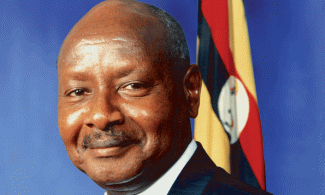
“The government’s citing fears of terrorism as a pretext for blocking social media is a threadbare argument that will convince no one."
Ugandan authorities blocked access to Twitter, Facebook, and WhatsApp ahead of yesterday’s inauguration of President Yoweri Museveni, who was recently re-elected to serve a fifth term.
According to Godfrey Mutabazi, the Executive Director of the Uganda Communications Commission, security officials requested the restrictions in order to “limit the possibility of terrorists’ taking advantage” of the inauguration to target foreign leaders present for the ceremony.

“The government’s citing fears of terrorism as a pretext for blocking social media is a threadbare argument that will convince no one,” said Robert Mahoney, the Deputy Executive Director of the Committee to Protect Journalists (CPJ).
“Social media platforms are a vital form of news dissemination. The authorities know this. That’s why they are censoring them yet again,” he added.
Ugandan regulators similarly blocked social media sites in February of this year during the presidential elections.
The latest move by the government is not the first to stir controversy surrounding the election.
Opposition members and human rights activists have condemned Mr. Museveni for unlawfully arresting and detaining the main opposition candidate, Kizza Besigye. His party, the Forum for Democratic Change, has also argued that the February elections were marked by irregularities and should be held again.
Mr. Museveni caused further controversy at his inauguration yesterday when he referred to the International Criminal Court as “a bunch of useless people,” causing delegates from the U.S., Canada, and the European Union to walk out of the ceremony.